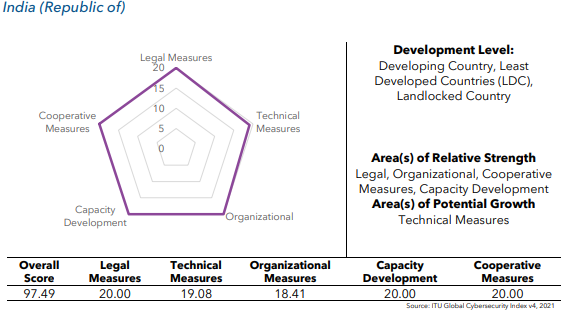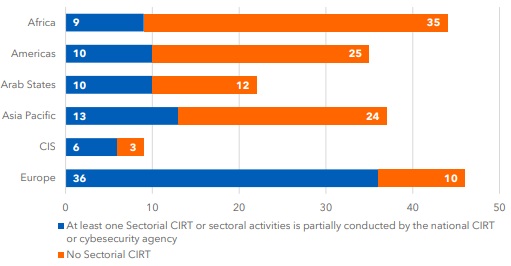In June 2021, the International Telecommunication Union (ITU) released the Global Cybersecurity Index 2020, a trusted reference that measures the commitment of countries to cybersecurity and promotes action towards secure digital ecosystems needed for recovery and growth.
Latest Context –
- India jumped 37 places to rank 10 with a score of 97.5 in the Global Cybersecurity Index (GCI) 2020. The Index was released just ahead of the sixth anniversary of the Digital India campaign, launched in the country on July 1, 2015.
- Top three rank holders of Global Cybersecurity index 2020 are:
- USA
- Saudi Arabia, United Kingdom (shared the 2nd rank)
- Estonia
- It was the fourth edition of the Index.
The various National and International Indices form an integral part of the UPSC Syllabus for the prelims examination, especially in terms of state and India’s ranks, respectively.
Global Cybersecurity Index 2020 [UPSC Notes]:-Download PDF Here
Aspirants looking forward to applying for the upcoming IAS Exam can complement their preparation with the related links given below:
| Global Indices & India’s Ranking | Types of Cyber Attacks |
| National Cyber Security Policy | Cyber Crime Volunteer Program |
GCI 2020 – Key Findings, Scores & Rankings
- Overall, the United States of America ranked at the first position in GCI 2020 with a score of 100
- The Democratic People’s Republic of Korea ranked at the last position with a score of 1.35
- In 2020, India ranked at the 10th position, in comparison to its 47th position in the last GCI
- In the Asia-Pacific region, India ranked at the 4th position
- The table given below mentions the region-wise toppers along with their scores:
| GCI Results – Regional scores and ranking of countries | ||
| Region | Country | Score |
| Africa | Mauritius | 96.89 |
| America | United States of America | 100 |
| Arab States | Saudi Arabia | 99.54 |
| Asia-Pacific | Korea (Rep. of) | 98.52 |
| Commonwealth of Independent States (CIS) | Russian Federation | 98.06 |
| Europe | United Kingdom | 99.54 |
- The image given below shows India’s status and scores based on the different parameters on which the Global Cybersecurity Index is analysed:

| Kickstart your IAS exam preparation now and complement it with the links given below: |
Parameters for GCI 2020 Assessment
There are five key parameters and themes of cybersecurity based on which the performance of the countries are analysed. Discussed below are the same.
- Legal Measures
- Legal and regulatory frameworks include the establishment of legislation for illicit activities in cyberspace, along with the tools to investigate, prosecute and enforce such legislation
- Data theft legislation must be passed by the countries
- Online harassment and online racism and xenophobia have also been a great cause of concern as per the statistics from GCI
- Online data privacy & protection – 133 countries have signed protection and privacy regulations into law, 15 are in the drafting process, and 46 have no regulation in place
- Legislation on the theft of personal information – This is important due to the increase in usage of social media platforms and online transactions. Of the 194 countries, 97 have passed a law, 17 have drafted and the remaining 80 countries have taken no action
- Online harassment legislation – Globally, 100 countries have adopted legislation criminalizing instances of online harassment and abuse, 17 are in the process of drafting and implementing these measures and 77 have no legislation on the subject
- Technical Measures
- Increased deployment of Computer Incident Response Teams (CIRTs) or Computer Emergency Response Teams (CERTs) enable countries to respond to incidents at the national level. At the end of 2020, 131 countries had established national CIRTs
- While national CIRTs address issues on the national level, sector-specific CIRTs address the cybersecurity needs of a specific sector such as health, transport, telecommunication, utilities. The image given below shows the number of sector-specific CIRTs:

- Organizational Measures
- Organizational measures examine the governance and coordination mechanisms within countries that address cybersecurity
- This year, more focus has been placed on countries engaging in a regular update of National Cybersecurity Strategies (NCS). This ensures that countries are adapting to the evolving realities
- 127 countries having a national cybersecurity strategy; 60 countries have demonstrated progress in establishing NCS
- Capacity Development Measures
- Digital technology brings immense economic and societal benefits, cyber risks can offset the benefits of digitalization. Securing the cyber domain through cybersecurity capacity building activities is key as it contributes to reducing issues such as the Digital Divide and cyber risks.
- Promoting three of the Sustainable Development Goals, SDG 8 (Decent Work and Economic Growth), SDG 9 (Industry, Innovation and Infrastructure), and SDG 10 (Reduced Inequalities) are important from the cybersecurity capacity development
- Public awareness of cybersecurity is also of utmost importance. Results from the GCI show that about 60 percent of countries are, or have been during the past two years, engaged in improving cyber awareness, against 38 per cent that did not report any cybersecurity campaigns
- Cooperative Measures
-
- Cybersecurity risks are increasingly borderless and collaboration remains an essential tool to tackle cybersecurity challenges
- Bilateral and multilateral agreements are crucial in codifying norms and behaviours and enhancing international cooperation on cybersecurity. GCI reports suggest that 90 countries out of 194 have a bilateral agreement in cybersecurity
- Public-private partnerships (PPP) are critical to cybersecurity efforts, from sharing actionable intelligence, exchanging good practice, and communicating R&D needs and priorities
COVID-19 Pandemic and its Impact on Cybersecurity – GCI Analysis
The report released by ITU mentions that since April 2020, when the COVID pandemic began to widespread across the world, internet usage increased by 30 percent.
This pandemic made digital tools and technology an integral part of everyone’s life and in such circumstances, cyber safety is of high importance. The ongoing pandemic has created
distrust, especially online and there is increased recognition of cybersecurity risk.
Also, read Coronavirus & Digital Solutions: RSTV- Big Picture
Global Cybersecurity Index 2020 [UPSC Notes]:-Download PDF Here
Furthermore, to get the latest exam updates, study material and tips for competitive exam preparation, candidates can visit BYJU’S.
Frequently Asked Questions on Global Cybersecurity Index
Q 1. What was India’s position in GCI 2020?
Q 2. Which country topped the overall Global Cybersecurity Index 2020?
| Other Related Links | |
| IAS Salary | International Organizations and Their Headquarters |
| Digital Education in India | E-Governance and its Significance |
| Cyber Crime Volunteer Program | Cybercrime |

Comments